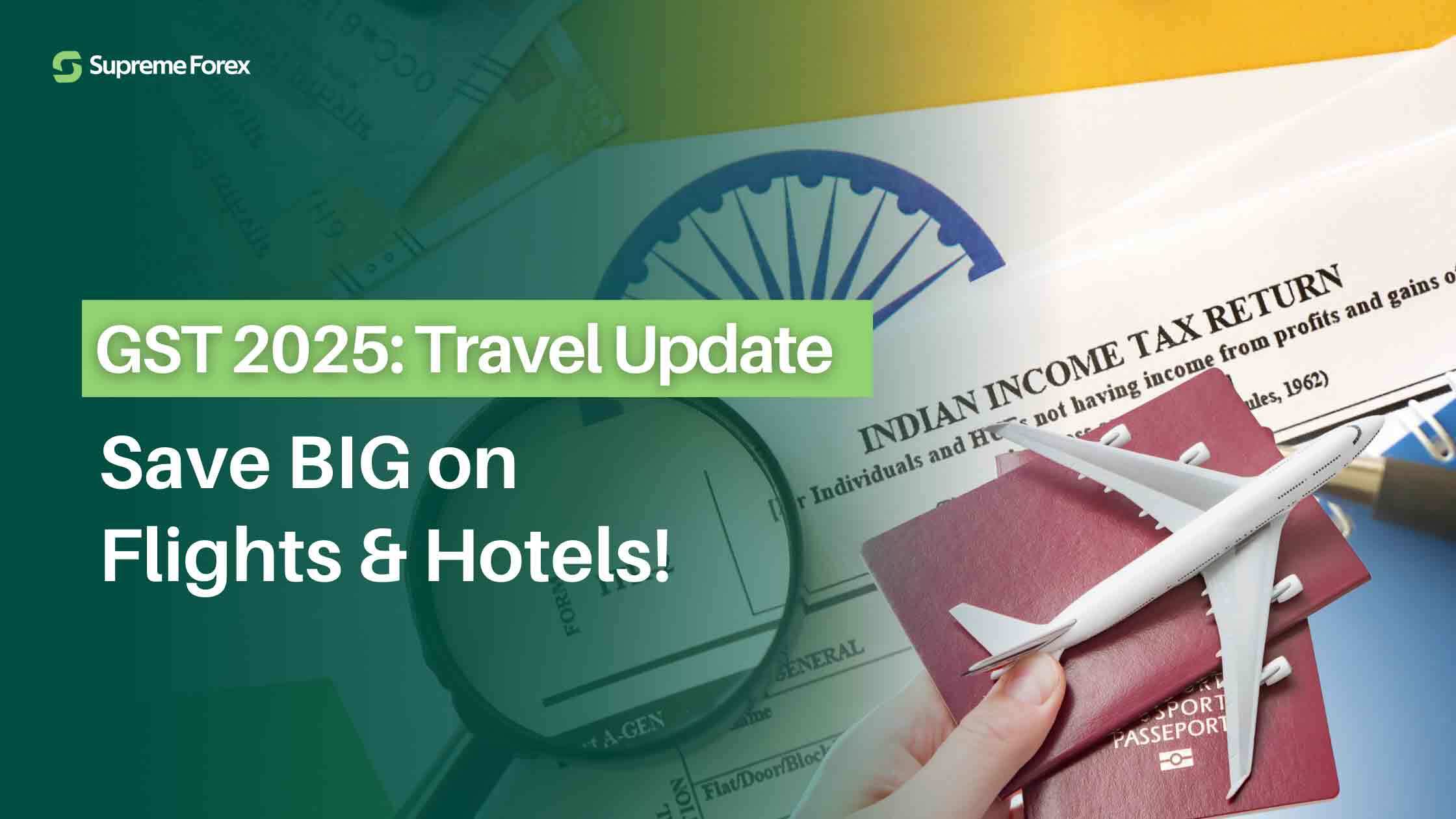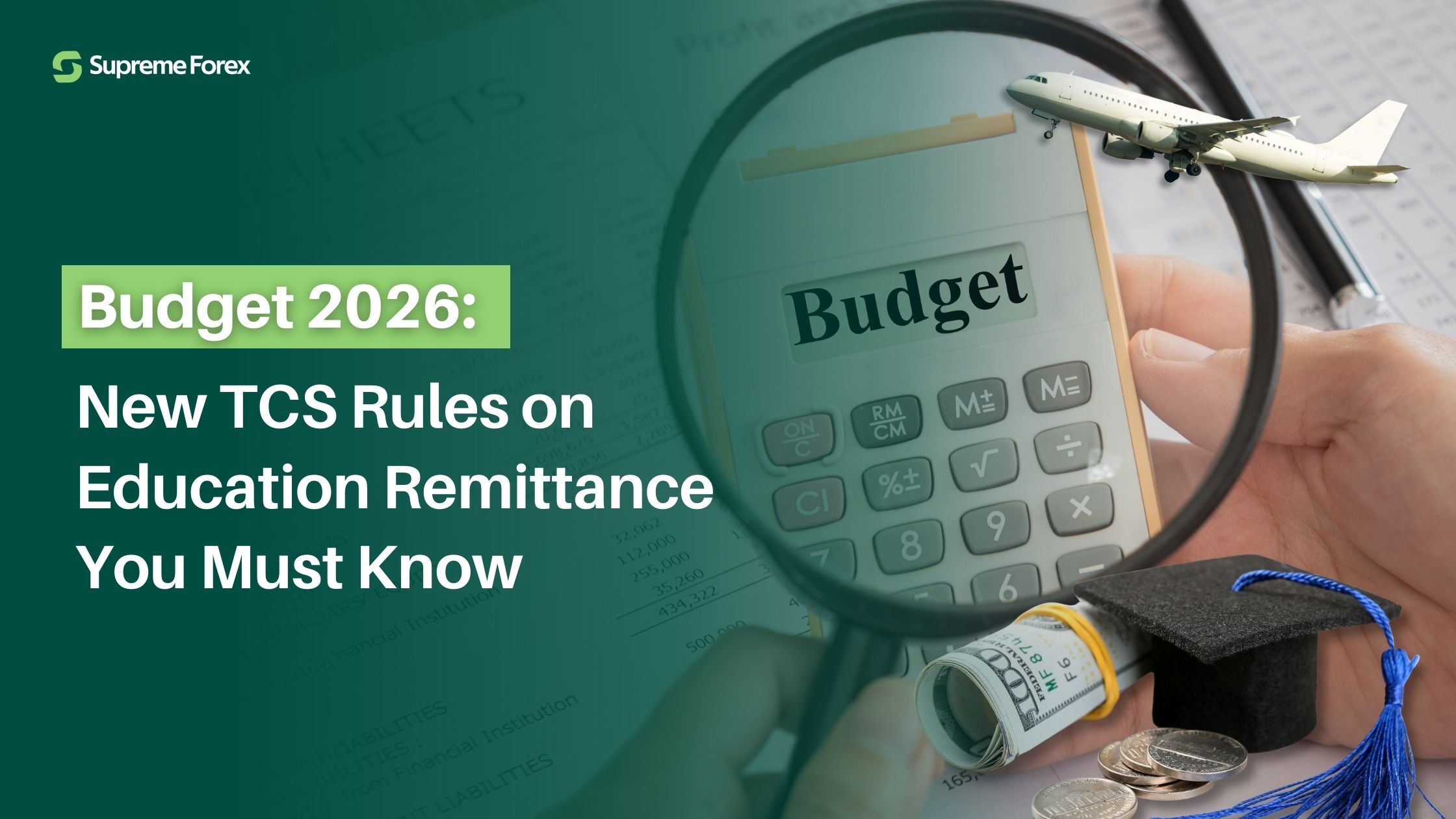The new GST rates 2025 are here, and travelers across India are asking the same question: Will flights and hotels now become cheaper or more expensive? The GST Council’s latest reforms have reshaped the GST tax slab for the travel and hospitality sector. With international and domestic travel steadily rising, these changes will directly affect how much you spend on air tickets, hotel bookings, dining, and even luxury travel. Understanding these revised slabs is not just about saving money; it’s also about planning smarter. For international travelers, the impact is even bigger, as GST applies differently to domestic air tickets, international flights, and hotel stays in India. This guide breaks down the revised GST on hotel booking, explores how it affects flights and foreign trips, and highlights how you can use services like Supreme Forex to manage travel costs effectively.
Table of contents
- Overview of the Revised GST Rates
- GST on Hotel Bookings – Cheaper Stays Ahead?
- GST on Air Travel – Domestic & International Flights
- Dining, Luxury Travel & Other Tourism Costs
- What Happens to Pre-Booked or Cancelled Travel?
- Overall Impact on the Tourism & Hospitality Industry
- Hidden Costs: International Trips Might Still Cost You More Despite Lower GST Rates!
- How to Save on Your 2025 International Trip – Smart booking tip and budget insight
- FAQs on GST New Tax Slabs 2025
- Conclusion
Overview of the Revised GST Rates
The revised GST rates under the 2025 reforms aim to simplify slabs and boost affordability in the travel and hospitality industry. This move was largely driven by the government’s goal of promoting tourism while making India more competitive compared to global destinations.
What changed in 2025?
- Hotel stays under ₹1,000/night now fall under a lower slab, making budget stays cheaper.
- Airfares for economy class are now taxed at a reduced rate, while premium and business classes see minimal changes.
- Dining and entertainment in mid-range hotels and restaurants have slightly lower GST charges, benefiting family travelers.
- Luxury resorts and high-end travel may still attract higher GST slabs, balancing affordability with revenue generation.
What remained the same?
- GST continues to be levied on both domestic and international travel services originating from India.
- Exemptions for very low-value stays and essential services remain intact.
In short, travel is becoming more budget-friendly for the majority of Indian travelers, especially those who choose mid-range hotels and economy-class flights while retaining higher charges for luxury categories.
Hidden Costs: International Trips Might Still Cost You More Despite Lower GST Rates!
Even with cheaper flights & hotels in 2025, you might still end up paying more when exchanging currency at airport counters. That’s because airport forex rates often include a 2–3% markup per transaction, hidden within the exchange rate itself. While lower GST has made forex transactions slightly more affordable, the higher service margins at airports offset most of that benefit – meaning you still lose value on every conversion.
To truly save, it’s smarter to buy your forex in advance. Save more by choosing Supreme Forex, where you get zero hidden fees, live market rates, and doorstep delivery – making every rupee count before you take off!
GST on Hotel Bookings – Cheaper Stays Ahead?
Hotels are one of the biggest spend categories on any trip, and the new GST rates 2025 make them friendlier for travelers. For most travelers, it means more savings on hotel bookings.
- Budget Hotels – Rooms priced under ₹1,000 are now tax-free, making budget travel more affordable.
- Mid-range Hotels (₹1,000 – ₹7,500) – GST reduced from 12% to 5%, allowing significant savings.
- Luxury Hotels (above ₹7,500) – Continue to attract higher GST of 18%, which means premium travelers will still pay more.
GST on Air Travel – Domestic & International Flights
Air tickets are often the most confusing area for GST application. Let’s simplify:
- Domestic Flights
- Economy class: Economy class tickets will now attract 5% GST, down from 12% to make air travel more affordable for the majority of passengers.
- Business class: Business class tickets will be taxed at 12%, compared to 18% earlier
- International Flights
- GST on international flight tickets is applicable only on certain charges collected in India (like convenience fees, surcharges).
- Outbound international tickets see minimal GST impact of 5% but domestic legs of an international journey do attract GST.
The economy is now cheaper, business and luxury remain premium. For frequent international travelers, reduced GST on domestic connections (say, Delhi–Mumbai before an onward international flight) makes trips slightly more affordable.
Dining, Luxury Travel & Other Tourism Costs
The gst new tax slab has also influenced dining and luxury travel experiences:
- Dining Out – Meals that were previously taxed at 12–18% will now attract just 5% GST, making eating out during travel cheaper.
- Luxury Resorts & Premium Experiences – Remain in higher tax slabs, GST has been increased from 28% plus 3% cess (31% effective) to a flat 40% GST, meaning luxury travel hasn’t become significantly cheaper.
- Tourism Activities – Adventure parks, theme parks, and guided tours may also reflect reduced GST, benefiting families and group travelers.
So, while the masses benefit from cost cuts in budget to mid-range services, luxury travelers continue to pay premium rates.
What Happens to Pre-Booked or Cancelled Travel?
A big question in 2025 is: “Do you have to pay extra GST if your travel date is after September 22, 2025?”
- Pre-booked travel: The applicable GST is based on the date of payment, not travel. So, if you booked before the GST revision, old rates apply.
- Cancelled bookings: Refunds are processed according to the slab applicable at the time of booking. Travelers may face minor adjustments.
- Post-revision bookings: Any tickets or rooms booked after the new GST slabs came into effect will reflect revised rates automatically.
This makes it essential to time your bookings smartly to maximize savings.
Overall Impact on the Tourism & Hospitality Industry
The revised GST rates have a ripple effect on the entire tourism industry:
- Boost for budget and domestic travel – Lower GST encourages Indians to explore more within the country.
- Positive outlook for inbound tourism – International travelers will find Indian hotels and flights more affordable.
- Challenges for the luxury segment – Premium hotels and business-class airlines may face slower growth due to higher slabs.
From an economic perspective, this aligns with India’s goal of making tourism more inclusive and attractive.
How to Save on Your 2025 International Trip – Smart booking tip and budget insight
Here are some smart strategies for travelers to save more under the new GST rules:
- Book hotels in the mid-range category – The sweet spot between comfort and affordability with reduced GST.
- Choose economy flights for domestic and short-haul international trips – Lower GST saves you more in the long run.
- Time your bookings – Lock in deals when GST is lower or before peak season surcharges.
- Use Supreme Forex for currency exchange – Save on international trips by avoiding hidden charges at airports and banks.
- Look for packages – Bundled hotel + flight + dining deals often absorb GST impacts better.
Supreme Forex Advantage: When traveling abroad, currency exchange rates and forex card fees can often outweigh GST savings. Supreme Forex ensures best-in-market forex rates, secure transfers, and hassle-free forex cards, helping you maximize overall savings on international trips.
FAQs on GST New Tax Slabs 2025
Q1. What is the new GST rate for hotel rooms?
Budget hotels below ₹1,000 are tax-free, mid-range hotels attract 5%, and luxury hotels 18%.
Q2. What is the GST rate for flights?
Domestic economy flights – 5%, business class – 12%, international flight tickets – 5% on Indian leg. Premium flight tickets (first class) attracts GST of 18%
Q3. Do Indians have to pay GST on international flight tickets?
Yes, but only on the portion of the fare originating in India. The foreign leg of the trip is exempt.
Q4. How will GST changes affect cancellations?
If bookings were made before GST changes, old rates apply. For cancellations after revision, GST refunds follow new rules.
Got other questions? Call or chat with us Now!
Conclusion
The new GST rates 2025 bring a mixed bag of opportunities. For most travelers, especially those opting for economy flights and mid-range hotels, travel will indeed become cheaper. Luxury travelers, however, will continue to pay higher rates under the gst new tax slab.
For international travelers, these GST savings on domestic segments, combined with smart forex management, can make a noticeable difference. That’s where Supreme Forex steps in, helping you save on currency exchange, forex cards, and international transfers so your overall travel costs stay low.
Whether you’re planning a domestic getaway or an international adventure, the revised GST rates make 2025 a great year to travel. Plan smart, book early, and pair it with Supreme Forex’s trusted solutions for the best savings.
Sources
Times of India
Economic Times
Money Control
NDTV
Also Read –
https://www.supremeforex.com/blogs/tcs-on-foreign-remittance-explained-with-refund-process/
https://www.supremeforex.com/blogs/visa-free-countries-for-indian-passport/



